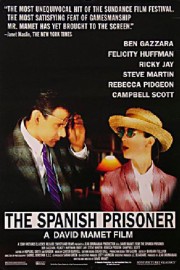The Spanish Prisoner
The first thought that I had when my mom and I first watched David Mamet’s “The Spanish Prisoner” was, “Damn, Steve Martin makes a great bad guy.” That, in and of itself, is a great takeaway, but when you watch the film, it’s hard not to get sucked in to mystery Mamet has in store for us. The film is still laying out pieces of its con even as the credits are getting ready to roll, but by that point, we’re ready to for anything Mamet wants to throw at us. This is a great piece of storytelling from one of the greats of the modern era.
When I was writing my short film, “Unwinnable Hand,” I think I had “The Spanish Prisoner” in mind when I was coming up with the narrative. The “process” that Campbell Scott’s Joe Ross has come up with is never defined, nor is the business he is a part of; the important thing is, everyone wants it because they can profit from it. It’s very much a McGuffin in the Hitchcockian tradition. You’d be surprised how difficult it is to pull off something so simple, yet so undefined for the audience, and still engage them- of course, I’m not David Mamet, so maybe it’s not that surprising. At a certain point, we stop thinking about what the “process” is and just wonder how Ross is going to get out of the predicament he’s in. Up until the point when he does get out of it, we’re still wondering. There’s always someone watching, after all, ready to manipulate the game in their favor, though.
Ross is on a business trip with a company lawyer (Ricky Jay) and a secretary (Rebecca Pidgeon) when he meets Jimmy Dell (Martin’s character). It’s an off-hand meeting on the beach; Jimmy tries to buy the camera Ross has, but Ross refuses. The two get friendlier as the trip goes along, and Jimmy hopes they will meet up when they’re back in New York. Jimmy gives Ross a package to take back to his sister, which is just the first step in a long con Jimmy has to try and get Ross’ “process” from him, and frame Ross as a criminal. Jimmy looking to sow distrust between Ross and his boss (Ben Gazzara) is just another step in his own process to get what he wants.
This was my first, real experience with Mamet as a storyteller, and it grabbed me from minute one. At this point, many people associated him with a foul-mouthed poetry in his writing, but this one is strictly PG, and works beautifully. You don’t need violence or profanity or even sexuality when you have a story with a hook, and Mamet has that. What he also has is the ability to challenge our ideas of characters while also showing us, plainly, who they are. Take Pidgeon’s character, Susan Ricci. She starts out as a wide-eyed woman who seems to be on the bottom rung of the corporation compared to Ross and Ricky Jay’s George Lang; going on this trip with them seems like a genuine treat for her. If you listen closely to her dialogue, however, she’s telling you very clearly the most important lesson you- and Ross- need to keep in mind throughout this film, “You never know who anybody is.” People will come at you in friendship- maybe even more- but that isn’t necessarily their endgame. They might just be looking to pick your pocket when you have your back turned.
One of the gifts of Mamet’s film is that there are times when he uses our familiarity with some actors against our intellect- as he does with Martin- while also using our relatively unfamiliarity with others- Pidgeon, Scott- to other effect. In Scott, if we aren’t entirely familiar with him, it’s actually easier to empathize with him as the con digs him into a deeper hole. There are other actors you’ll recognize- Felicity Huffman and Ed O’Neil, in particular- but you’ll have to let the film show you how they fit into the drama. This is a rich film for actors to shine, as well as a composer like Carter Burwell, whose evocative, distinct sound fits perfectly with this film’s tone, and gives us an emotional through line to follow until the very end. Film noir of the highest order.










